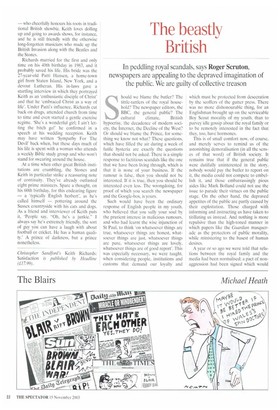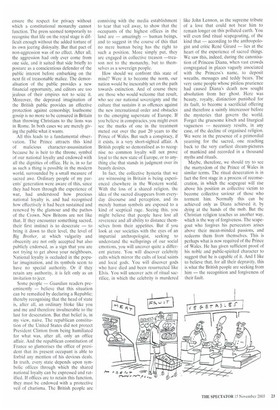The beastly British
In peddling royal scandals, says Roger Scruton, newspapers are appealing to the depraved imagination of the public. We are guilty of collective treason Should we blame the butler? The tittle-tattlers of the royal household? The newspaper editors, the BBC, the general public? The
cultural climate, British hypocrisy, the decadence of modern society, the Internet, the Decline of the West? Or should we blame the Prince, for something we know not what? These questions, which have filled the air during a week of futile hysteria are exactly the questions that should not be asked. There is a simple response to factitious scandals like the one that we have been living through, which is that it is none of your business, If the rumour is false, then you should not be interested. If it is true, then you should be interested even less. The wrongdoing, for proof of which you search the newspaper and the Google-box, is yours.
Such would have been the ordinary response of English people in my youth, who believed that you sully your soul by the prurient interest in malicious rumours, and who had learnt the wise injunction of St Paul, to think 'on whatsoever things are true, whatsoever things are honest, whatsoever things are just, whatsoever things are pure, whatsoever things are lovely, whatsoever things are of good report'. This was especially necessary, we were taught, when considering people, institutions and customs that demand our loyalty and which must be protected from desecration by the scoffers of the gutter press. There was no more dishonourable thing, for an Englishman brought up on the serviceable Boy Scout morality of my youth, than to purvey idle gossip about the royal family or to be remotely interested in the fact that they, too, have hormones.
This is of small comfort now, of course, and merely serves to remind us of the astonishing demoralisation (in all the senses of that word) of British society. It remains true that if the general public were dutifully uninterested in the story, nobody would pay the butler to report on it, the media could not compete to embellish it, and those embarrassingly pious aides like Mark Bolland could not use the issue to parade their virtues on the public stage. On the other hand, the depraved appetites of the public are partly caused by their exploitation. Those charged with informing and instructing us have taken to titillating us instead. And nothing is more repulsive than the high-toned manner in which papers like the Guardian masquerade as the protectors of public morality, while ministering to the basest of human desires.
A year or so ago we were told that relations between the royal family and the media had been normalised; a pact of nonaggression had been signed which would
ensure the respect for privacy without which a constitutional monarchy cannot function. The press seemed temporarily to recognise that life on the royal stage is difficult enough without the added torture of its own jeering disloyalty. But that pact of non-aggression was of no effect. After all, the aggression had only ever come from one side, and it suited that side briefly to posture as a conscientious defender of the public interest before embarking on the next fit of treasonable malice. The demoralisation of the public provides a new financial opportunity, and editors are too jealous of their empires not to seize it. Moreover, the depraved imagination of the British public provides an effective protection against censorship; loathsome gossip is no more to be censured in Britain than throwing Christians to the lions was in Rome. In both cases we are merely giving the public what it wants.
All this leads to a fundamental observation. The Prince attracts this kind of malicious character-assassination because he is heir to the throne, symbol of our national loyalty and endowed with all the dignities of office. He is, in so far as such a thing is possible in the modern world, surrounded by a small measure of sacred awe. Ordinary people of my parents' generation were aware of this, since they had been through the experience of war, had understood how precious national loyalty is, and had recognised how effectively it had been sustained and renewed by the glamour and the pathos of the Crown. New Britons are not like that. If they encounter something sacred, their first instinct is to desecrate — to bring it down to their level, the level of Big Brother, at which vulgarity and obscenity are not only accepted but also publicly endorsed, as a sign that you are not trying to get above your neighbours. National loyalty is occluded in the popular imagination, and its symbols seem to have no special authority. Or if they retain any authority, it is felt only as an invitation to jeer.
Some people — Guardian readers preeminently — believe that this situation can be remedied by declaring a Republic; thereby recognising that the head of state is, after all, an ordinary bloke like you and me and therefore invulnerable to the lust for desecration. But that belief is, in my view, naive. The republican constitution of the United States did not protect President Clinton from being humiliated for what was, after all, only an office affair. And the republican constitution of France so glamorises the office of president that its present occupant is able to forbid any mention of his devious deals. In truth, every state depends upon symbolic offices through which the shared national loyalty can be expressed and ratified. If offices are to retain this function, they must be endowed with a protective veil of charisma. The British people are
conniving with the media establishment to tear that veil away, to show that the occupants of the highest offices in the land are — amazingly — human beings, and to suggest in the course of this that no mere human being has the right to such a position. More simply put, they are engaged in collective treason —treason not to the monarchy, but to themselves as a sovereign people.
How should we confront this state of mind? Were it to become the norm, our nation would be inexorably set on the path towards extinction. And of course there are those who would welcome that result, who see our national sovereignty and the culture that sustains it as offences against the new international order and obstacles to the emerging superstate of Europe. If you believe in conspiracies, you might even see the marks of one in the treatment meted out over the past 20 years to the Prince of Wales. But such a conspiracy, if it exists, is a very short-sighted affair. A British people so demoralised as to recognise no common loyalty will not prove loyal to the new state of Europe, or to anything else that stands in judgment over its beastly desires.
In fact, the collective hysteria that we are witnessing in Britain is being experienced elsewhere in the Western world. With the loss of a shared religion, the idea of the sacred disappears from everyday discourse and perception, and its merely human symbols are exposed to a kind of sceptical rage. Seeing this, you might believe that people have lost all reverence and all ability to distance themselves from their appetites. But if you look at our societies with the eyes of an impartial anthropologist, seeking to understand the wellsprings of our social emotions, you will uncover quite a different picture. You will discover celebrity cults which mirror the cults of local saints and local gods. You will discover gods who have died and been resurrected like Elvis. You will uncover acts of ritual sacrifice, in which the celebrity is murdered like John Lennon, as the supreme tribute of a love that could not bear him to remain longer on this polluted earth. You will even find ritual scapegoating, of the kind that — according to the anthropologist and critic Rene Girard — lies at the heart of the experience of sacred things. We saw this, indeed, during the canonisation of Princess Diana, when vast crowds congregated in places vaguely associated with the Princess's name, to deposit wreaths, messages and teddy bears. The very same people whose pitiless prurience had caused Diana's death now sought absolution from her ghost. Here was beauty, royalty, distinction punished for its fault, to become a sacrificial offering and therefore a saintly intercessor before the mysteries that govern the world. Forget the gruesome kitsch and liturgical vagueness — necessary results, in any case, of the decline of organised religion. We were in the presence of a primordial yearning for the sacred, one reaching back to the very earliest dream-pictures of mankind and recorded in a thousand myths and rituals.
Maybe, therefore, we should try to see the martyrdom of the Prince of Wales in similar terms. The ritual desecration is in fact the first stage in a process of reconsecration, in which the scapegoat will rise above his position as collective victim to become collective saviour of those who torment him. Normally this can be achieved only as Diana achieved it, by dying at the hands of the mob. But the Christian religion teaches us another way, which is the way of forgiveness. The scapegoat who forgives his persecutors arises above their mean-minded passions, and redeems them from themselves. This is perhaps what is now required of the Prince of Wales, He has given sufficient proof of his noble and public-spirited character to suggest that he is capable of it. And I like to believe that, for all their depravity, this is what the British people are seeking from him — the recognition and forgiveness of their fault.



























































































 Previous page
Previous page